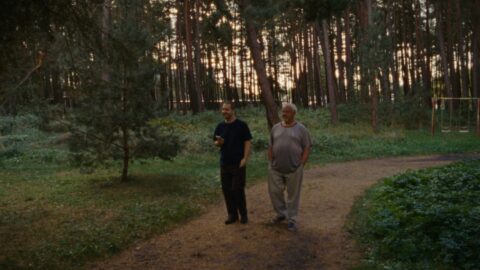When Danielus (Darius Šilėnas) returns home to sell his old flat on the Baltic coast of Lithuania, he does so alone, leaving his wife Rita (Hanna Mathisen Haga) back in Norway. This decision to travel solo seemingly stems not only from childcare duties — they have a young child named Jonas (Liva Louise Karlstrøm Våsbotn) — but a desire for true closure. It’s easier to do that without having to worry about translating that experience into English for your Norwegian partner.
The issue I found with the gorgeously-made yet stultifying The Visitor (Vytautas Katkus, 2025), is that this experience isn’t really translated towards the viewer either, holding us at a remove both emotionally and aesthetically throughout.
At first, we are promised a classical scenario; an expat returning home, reflecting on the gap between his life now and the way it used to be; caught between cultures, ideas, peoples. But from almost the very beginning, as Danielus takes his first of many walks in the woods, or has a long yet fairly banal conversation with his neighbour Vismante (Vismante Ruzgaite) about missing his dad’s funeral and looking after her dog, it becomes obvious that the plot will take a backseat to carefully-observed naturalism and a well-rendered sense of atmosphere.
First-time feature director Vytautas Katkus is already a highly acclaimed cinematographer. It’s his askew sense of composition and granular detail that gave Locarno-winner Toxic (Saule Bliuvaite, 2024) its playfulness and lived-in feeling of reality. The Visitor (2025) also tackles a similarly forgotten corner of rural Lithuania, with Katkus, working behind the camera as well as directing, exploiting the natural beauty of the bucolic Baltic coast as a means to explore and push the limits of his aesthetic style.
And as a portfolio-builder, this film is a complete technical success. One doubts that after this and Toxic, Katkus will ever be short of work as a cameraman ever again. Shooting on film in the Golden Ratio, utilising heavy contrasts and capturing the nuances of colour and shade and light, it looks amazing throughout. Most of the time, Katkus shoots in medium-distance shots, completely eschewing close-ups or shot-reverse-shot sequences. It allows him to really situate the protagonist in his environment, giving us a feel for his world, even if we never really get a feel for who he is, or what he wants.
In its prioritisation of mood over plot, aesthetics over meaning, this film feels extremely Rotterdam-coded, bringing to mind Stefan Djordjevic’s semi-autobiographical Serbian film Wind, Talk to Me (2025), which played in the Tiger Competition. Both films suffer from the same problem, in which everything feels well-made and handsome, but there is little emotional connection found in either portrait of tender, male ennui.
A short anecdote about Marvin Gaye and his time in Ostend, a small town on the Belgian coast, seems crucial to understanding the idea behind The Visitor. The legendary soul singer, suffering from drug and drink issues, as well as tax problems, ended up staying for 18 months, writing “Sexual Healing” (1982) in the process. It all went downhill when he went back, ending in his death at the hands of his father. The implication is that some timeout and the sea air can result in a fresh creative spark. This world has certainly ignited Katkus’ compositional senses. One only wished that the script, penned between him and Slow (2023) director Marija Kavtaradze, was up to par with all those lovely images.
Redmond is the editor-in-chief of Journey Into Cinema.

